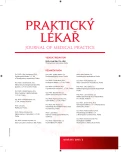-
Medical journals
- Career
Hagiotherapy as a component method of psychotherapy
Authors: M. Česneková
Authors‘ workplace: Stomatologická klinika 1. LF UK a VFN, Praha, Přednosta: doc. MUDr. René Foltán, Ph. D. ; Klinika adiktologie 1. LF UK a VFN, Praha, Přednosta: prof. PhDr. Michal Miovský Ph. D.
Published in: Prakt. Lék. 2015; 95(2): 68-72
Category: Of different specialties
Overview
Hagiotherapy is one of the forms of bibliotherapy, which belongs among the disciplines that are based in psychiatry and psychology. The term bibliotherapy comes from the Greek words “biblos” (a book) and “therapia” (care). Bibliotherapy uses literature in treatment of people with mental illnesses or emotional issues. The aim of reading a book as a therapy is to influence positively the patient’s psychosomatic state. Reading also fosters the ability of imagination, creativity and critical thinking. Bibliotherapy in general uses any appropriate books. Hagiotherapy (the term is derived from the Greek words “hagios” – holy, sacred, and “therapia” – care, treatment) uses the texts of the Bible. Through the analysis of a Biblical text, its plot, moral conflict and the characters’ behaviour, the patient’s personal problems come gradually out. The Biblical texts include the timeless motifs of death, guilt, values and meaning, which are introduced here in images or symbols from the lives of people of the ancient times. That makes the Bible a suitable text for this purpose because it deals, among others, with similar themes as psychology: with human pain, joy, solitude, uncontrolled aggression, and death. In hagiotherapy the aim is to lead the clients themselves to find the solution to their problem, to realize their shortcomings and subsequently change their behaviour.
A hagiotherapy session is led as a group therapy and lasts two hours in average. After reading a story, the therapist invites the clients to give their opinions on the text, and to describe the feelings evoked by the story. Everybody is free to express their opinions, the therapist reacts to their answers and asks another questions to show them a possible different point of view concerning the given event or character. The basic questions of values, such as the question of good and evil, love and hate, revenge and forgiveness, illness and health, appear in the discussion. To create a friendly atmosphere, the clients sit in a circle, close to each other, and they call each other first names. Hagiotherapy session aims to bring the patients to understand the flaws they have made in their lives, to make them change their behaviour and to sparkle their interest in higher moral values.Keywords:
hagiotherapy – bibliotherapy – psychotherapy – psychology – group session
Sources
1. Beier M. A Violent God – Image: An introduction to the work of Eugen Drewermann. London: Bloomsbury Academic 2006.
2. Česneková M. Přínos hagioterapie v léčbě závislosti očima klientů. Bakalářská práce, Praha: 1. LF UK 2013.
3. Drewermann E. Co je důležité, je očím neviditelné. Brno: Centrum pro studium demokracie a kultury 1996.
4. Drewermann E. Tragické a křesťanské. Psychoanalýza ve službách současné morální teologie? Brno: Centrum pro studium demokracie a kultury 1997.
5. Frankl VE. A přesto říci životu ano. Praha: Karmelitské nakladatelství 2000.
6. Frankl VE. Vůle ke smyslu. Brno: Cesta 2006.
7. Frankl VE. Psychoterapie a náboženství – Hledání nejvyššího smyslu. Brno: Cesta 2007.
8. Kalina K. a kol. Základy klinické adiktologie. Praha: Grada Publishing 2008.
9. Kruszewsky T. Biblioterapie – léčba četbou. Čtenář: měsíčník pro knihovny [online] 2008 [cit. 2013-04-28]. Dostupné z: http://ctenar.svkkl.cz/clanky/rocnik-2008/0708-2008/tema-biblioterapie-lecba-cetbou-43-196.htm.
10. Langle A. Emoce a existence. Praha: Dialogos 2006; 5–19.
11. Nešpor K. Návykové chování a závislost: současné poznatky a perspektivy léčby. Praha: Portál 2000.
12. Nešpor K. Jak překonat problémy s alkoholem. Praha: Sportpropag 2004.
13. Remeš P. Hagioterapie – nový směr psychoterapie. Čes. a slov. Psychiatr. 1998; 4 : 206–210.
14. Remeš P. Bible a psychoterapie. Psychologie Dnes 2000; 2(2): 22–23.
15. Schovanková L. Hagioterapie pro ženy v krizových situacích: se zaměřením na léčbu alkoholové závislosti v Psychiatrické léčebně Bohnice. Diplomová práce. Brno: Masarykova univerzita 2006.
Labels
General practitioner for children and adolescents General practitioner for adults
Article was published inGeneral Practitioner

2015 Issue 2-
All articles in this issue
- Dog’s olfactory system in medicine and human malignant or other diseases
- Job dissatisfaction of nurses in the Czech Republic
- What to tell patients about e-cigarettes?
- Hagiotherapy as a component method of psychotherapy
- Sinus pilonidalis sacrococcygealis
- Alcohol in primary health care: experiences and attitudes of Czech general practitioners
- Pseudotumor cerebri
- A personality of Czech anatomy and pathology of the 19th century: Vincenc Alexandr Bochdalek
- General Practitioner
- Journal archive
- Current issue
- Online only
- About the journal
Most read in this issue- Sinus pilonidalis sacrococcygealis
- Pseudotumor cerebri
- Job dissatisfaction of nurses in the Czech Republic
- A personality of Czech anatomy and pathology of the 19th century: Vincenc Alexandr Bochdalek
Login#ADS_BOTTOM_SCRIPTS#Forgotten passwordEnter the email address that you registered with. We will send you instructions on how to set a new password.
- Career

